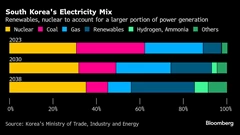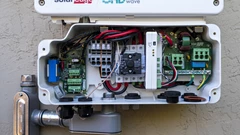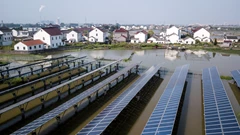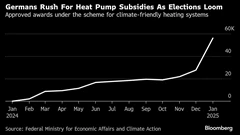With Trump Looming, Biden’s Green Bank Moves to Close Billions in Deals
(Bloomberg) -- US President Joe Biden’s $400 billion green bank has just weeks to close billions of dollars in deals to finance green technology before handing the keys to the Trump administration.
The Energy Department’s Loan Programs Office (LPO) has provided crucial support for companies deploying first-of-its-kind technology and large projects that banks typically shy away from. Among other loans under Biden, LPO has made a record $9.2 billion offer to Ford Motor Co. to finance building three battery factories and provided $1.5 billion to Holtec International Corp. to restart a shuttered nuclear power plant.
Yet more than $40 billion in conditional commitments could be in jeopardy once President-elect Donald Trump takes office. Since the election, LPO has announced a $4.9 billion loan guarantee to renewables developer Invenergy LLC for a high-voltage transmission line project; a $6.6 billion conditional loan to Rivian Automotive Inc.; and a $7.5 billion loan for a joint venture between Samsung SDI Co. and Stellantis NV to create battery manufacturing plants in Indiana.
It’s still possible the Energy Department has time to close on those commitments, but it won't be easy, said Kennedy Nickerson, who formerly worked as a policy adviser in the Loan Programs Office.
“It would be very quick and relies on a heavily bureaucratic process running perfectly, but it’s possible,” said Nickerson, who now serves as a vice president at Capstone, a Washington-based research group. “The Biden administration recognizes the risk, and they are working hard to make the loan guarantees and loan agreements as airtight as possible” before Trump takes over.
When asked if the Energy Department had enough time to close on pending loans, Jigar Shah, the office’s director, said it was up to borrowers to complete the Energy Department’s rigorous vetting process.
“Right now, borrowers are sufficiently motivated to move more quickly then they have, probably a year ago,” he said. “It’s up to the borrowers. Our process hasn’t changed.”

During his first administration, Trump attempted to kill the program. This time, some in his inner circle want to eliminate or retool LPO to finance fossil fuels and other energy sources favored by Republicans.
Already one of the two leaders tapped by Trump to lead the so-called Department of Government Efficiency, Vivek Ramaswamy, has vowed the incoming administration will scrutinize and rescind billions of dollars in “11th-hour” Energy Department loans. (The other is Elon Musk, whose company Tesla Inc. benefited from an LPO loan during the Obama administration.) Chris Wright, Trump's nominee for Energy Secretary, has slammed subsidies for wind and solar power and called greenhouse gas reduction targets “perverse.” He has, however, talked up the benefits of nuclear power.
Jonathan Silver, who oversaw the Loan Programs Office during President Barack Obama’s first term, said Republicans can choose to dismantle it at their peril.
“The greatest irony,” he wrote in an email, “is that by attempting to slow down this inevitable and necessary transformation, the ‘drill baby, drill’ crowd is actually increasing the chances that the next administration will be forced to introduce government mandates to get us back on track.”
LPO got an infusion of cash from Biden’s signature climate law. It has nearly $400 billion in remaining loan authority, the Energy Department said in November.
The administration has yet to close 18 loans, including a $2 billion commitment made in February 2023 to Redwood Materials Inc., a battery recycler led by a Tesla alum.
The time needed to finalize loans makes it unlikely they all will be done before Biden leaves office. The average LPO decision takes more than 200 days to wrap up, though the Biden administration closed its first deal — a roughly $500 million loan guarantee for a hydrogen project in Utah — in roughly 40 days.
Pat Gruber, the chief executive officer of biofuel maker GEVO Inc., said there is no chance the Biden administration will close on his company’s $1.46 billion loan. offered in October. The company still needs to raise equity and complete other details, though he was optimistic the new administration would see it across the finish line.
Clawing funding back wouldn’t be easy for the Trump administration, especially if the money has been sent, said Peter Davidson, the founder and chief executive officer of Aligned Climate Capital who served as the office’s executive director from 2013 to 2015.
“Once a loan has been obligated, it’s a binding contract with the government so it has to be paid,” Davidson said. “Once the money is obligated, if it isn’t sent to the borrower, you are in a legal dispute, and it has to be settled in the courts.”

The office has had a reputation for caution ever since its first loan went badly awry. In 2009, the office gave a $535 million loan guarantee to Solyndra to make tube-shaped solar panels at a new factory in the San Francisco Bay Area. The company tumbled into bankruptcy two years later, igniting a political firestorm. Joe Mastrangelo, chief executive officer of advanced battery company Eos Energy Enterprises Inc., said LPO remains determined to avoid another flameout, even if it slows the application process.
His company first approached the Energy Department about four years ago, received a conditional commitment in 2023, and recently closed a $303.5 million loan to cover the costs of the production line at its plant outside Pittsburgh and add a second line as well as possibly installing two lines at another facility nearby.
Mastrangelo said that any financing mechanism for startups developing new technologies will end up funding some failures: “If we’re doing our job right, as a country, there’s going to be failures in the program — there have to be. You’ve got to have a process that moves at market speed.”
LPO also relies on other agencies’ expertise when deciding to fund projects. That adds another speed bump to getting money out the door as other parts of the administration try to insulate Biden’s legacy from Trump.

Plug Power Inc. has had to work not just with DOE but with the Environmental Protection Agency and the Army Corps of Engineers as it tries to finalize a $1.66 billion loan to build a series of clean hydrogen production plants, CEO Andy Marsh said.
While critics often complain that the government makes a poor venture capitalist, Marsh said the loan office understands clean tech startups and large company projects better than many firms in the private sector. “The government’s actually smarter about what the perceived risks are, just because they’ve been involved in these projects,” he said. “If it’s something that hasn’t been done before, it’s tough for the private sector to put the right risk on it.”
©2024 Bloomberg L.P.
KEEPING THE ENERGY INDUSTRY CONNECTED
Subscribe to our newsletter and get the best of Energy Connects directly to your inbox each week.
By subscribing, you agree to the processing of your personal data by dmg events as described in the Privacy Policy.
More renewables news

GB Energy Faces New Doubts as UK Declines to Affirm Future Funds

Korea Cancels Planned Reactor After Impeaching Pro-Nuke Leader

Brazil’s Net-Zero Transition Will Cost $6 Trillion by 2050, BNEF Says

SolarEdge Climbs 40% as Revenue Beat Prompts Short Covering

EU to Set Aside Funds to Protect Undersea Cables from Sabotage

China Revamps Power Market Rules In Challenge to Renewables Boom

KKR increases stake in Enilive with additional €587.5 million investment

TotalEnergies and Air Liquide partner to develop green hydrogen projects in the Netherlands

Germany Set to Scale Down Climate Ambitions
















